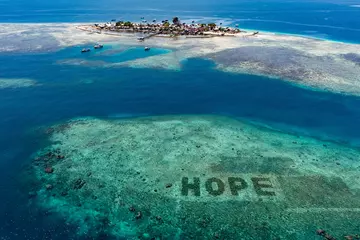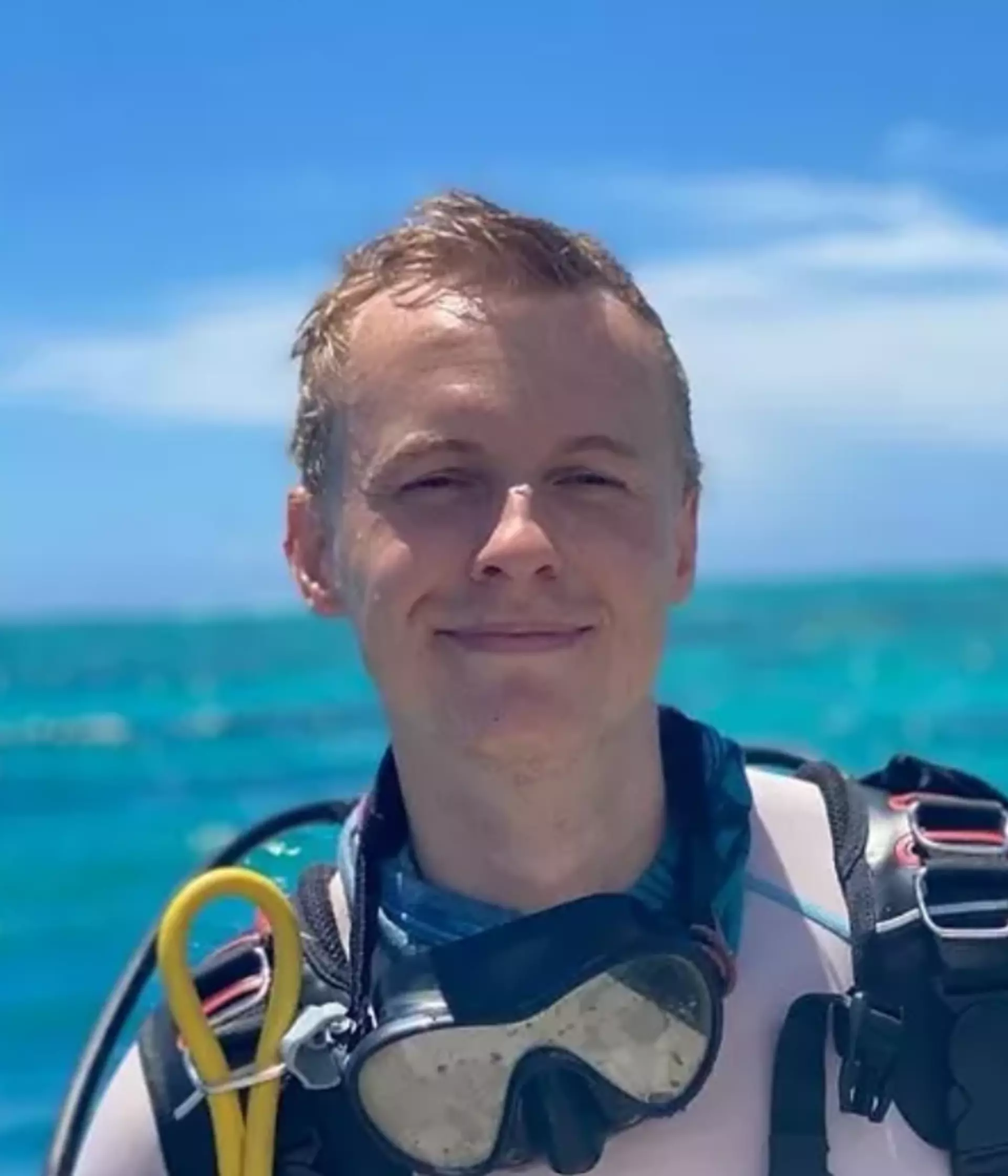
Marine biology
Institute of Zoology
Zoological Society of London
Regent's Park
London
NW14RY
Ben's research focuses on ways we can support tropical reef conservation and restoration with artificial intelligence.
Ben is a PhD student at ZSL and UCL, supported by the Fisheries Society of the British Isles. Ben's research focuses on developing machine learning techniques to monitor and support coral reef conservation. To date, Ben has primarily focused on monitoring coral reefs using the ‘soundscape’. This has included the development of low-cost recording technology and machine learning–driven analysis, giving Ben extensive field experience, with 300 scientific dives and over 18 months spent on expedition, whilst also becoming adept in AI through skills in deep learning and high-performance computing.
A significant portion of this work has focused on tracking recovery on restored reefs, research which won the prestigious 2023 NetExplo Award for the top digital innovation for sustainability globally. Ben is now combining these techniques to help advance our understanding of reef restoration’s impact on ecological functioning using datasets from across the tropics. Ben also applys machine learning to detect illegal bomb fishing, a major cause of reef destruction across the globe. Ben is interested in how other machine learning techniques can be used to support coral reef conservation, including co-leading a 2023 hackathon where participants used image data to track restoration progress.

Industry partnerships
Ben collaborates closely with industry partners, including Mars, which operates the world’s largest coral reef restoration programme (buildingcoral.com), where Ben spent six months on secondment during his PhD. Ben was also invited onto Google DeepMind's prestigious PhD Student Researcher Programme, spending three months in San Francisco working with Perch, DeepMind's bioacoustics team. With colleagues, Ben helped develop SurfPerch, a foundational model for reef bioacoustics. You can try SurfPerch out for yourself here.
Ben works closely with start-ups including Wildflow who Ben has supported in developing large-scale 3D spatial twins of coral reefs (take a look at a demo). Ben also collaborated with Datascape Realities from their establishment, who are helping communicate science through VR including coral reef restoration. Ben has also worked with Aqoustics who are developing tools to support the monitoring of ocean habitats through acoustics, including collaboration together on Google Arts and Cultures 'Calling in our corals' citizen science platform.
Media engagement
Ben believes in the importance of scientific communication. Work he has led has received coverage in numerous high-profile media outlets, including articles in The Times, Forbes, Bloomberg and live radio appearances on stations such as the BBC and The Times Radio. A highlight includes Ben's TEDx London 2025 talk: 'How AI is helping transform coral reef conservation'. Ben has also volunteered on the Reef Conservation UK committee since 2022, supporting the annual RCUK conference where 150 scientists and reef practitioners come together to share their work.
2023-2023 (3 months): PhD Student Researcher, Google DeepMind 2023-2023 (6 months): Science Officer at Mars Inc
2022-present: Reef Conservation UK Committee Member
2021-present: PhD student at UCL and ZSL
2020-2021: Research Associate, University of Exeter
2019-2021: MbyRes in Biological Sciences from the University of Exeter
2015-2019: BSc (Hons) in Biological Sciences from the University of Exeter
Williams, B., van Merriënboer, B., Dumoulin, V., Hamer, J., Triantafillou, E., Fleishman, A.B., McKown, M., Munger, J.E., Rice, A.N., Lillis, A. and White, C.E., 2025. Leveraging tropical reef, bird and unrelated sounds for superior transfer learning in marine bioacoustics. Philsophical Transactions of the Royal Society B. Accepted, in-press, preprint doi: https://doi.org/10.48550/arXiv.2404.16436
Davidson, I.K., Williams, B., Stratford, J.E., Chapuis, L., Simpson, S.D. and Radford, A.N., 2024. Context-dependent multimodal behaviour in a coral reef fish. Royal Society Open Science, 11(5), p.240151. doi: https://doi.org/10.1098/rsos.240151
Vida, R.T., Razak, T.B., Mogg, A.O., Roche, R., Lynch, J., Williams, B., Mars Coral Restoration Project Monitoring Team, Damayanti, L., Prasetya, M.E., Maulana, P.B. and Hamka, A., 2024. Impacts of “Reef Star” coral restoration on multiple metrics of habitat complexity. Restoration Ecology, 32(8), p.e14263. doi: https://doi.org/10.1111/rec.14263
Weschke, E., Schligler, J., Hely, I., Roost, T., Schies, J.A., Williams, B., Dworzanski, B., Mills, S.C., Beldade, R., Simpson, S.D. and Radford, A.N., 2024. Artificial Light Increases Nighttime Prevalence of Predatory Fishes, Altering Community Composition on Coral Reefs. Global Change Biology, 30(12), p.e70002. doi: https://doi.org/10.1111/gcb.70002
Williams, B., Lamont, T.A., Chapuis, L., Harding, H.R., May, E.B., Prasetya, M.E., Seraphim, M.J., Jompa, J., Smith, D.J., Janetski, N. and Radford, A.N., 2022. Enhancing automated analysis of marine soundscapes using ecoacoustic indices and machine learning. Ecological Indicators, 140: 108986. doi: https://doi.org/10.1016/j.ecolind.2022.108986
Lamont, T.A., Chapuis, L., Williams, B., Dines, S., Gridley, T., Frainer, G., Fearey, J., Maulana, P.B., Prasetya, M.E., Jompa, J. and Smith, D.J., 2022. HydroMoth: Testing a prototype low‐cost acoustic recorder for aquatic environments. Remote Sensing in Ecology and Conservation. doi: https://doi.org/10.1002/rse2.249
Lamont, T.A., Williams, B., Chapuis, L., Prasetya, M.E., Seraphim, M.J., Harding, H.R., May, E.B., Janetski, N., Jompa, J., Smith, D.J. and Radford, A.N., 2022. The sound of recovery: Coral reef restoration success is detectable in the soundscape. Journal of Applied Ecology, 54: 742-756. doi: https://doi.org/10.1111/1365-2664.14089
Williams, B., Chapuis, L., Gordon, T.A. and Simpson, S.D. Low-cost action cameras offer potential for widespread acoustic monitoring of marine ecosystems. 2021. Ecological Indicators. 129: 107957. doi: 10.1016/j.ecolind.2021.107957
Mahesh, R., Saravanakumar, A., Thangaradjou, T., Solanki, H.U., Raman, M. and Williams, B. Seasonal and spatial variations of mesozooplankton energy transfer efficiency determined using remotely sensed SST and Chl-a in the Bay of Bengal. Regional Studies in Marine Science. 2020. 40: 101482. doi: 10.1016/j.rsma.2020.101482
- Mars data scientists turn their skills to coral reef restoration
The soundscapes of restored reefs - Groundbreaking innovation from Mars coral reef restoration program wins no1 innovation award
- The growing scientific effort at Hope Reef
- Reefs don’t just look better after restoration – they also sound healthier
- Studying coral reef soundscapes with new kit and new questions
- Studying Reef Soundscapes During the COVID-19 Pandemic
- Fashion’s Impact on the Marine Environment
- Investigating coral reef acoustics to aid reef restoration
